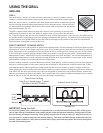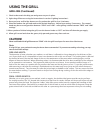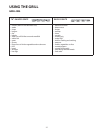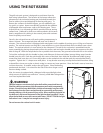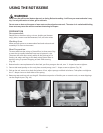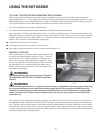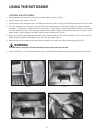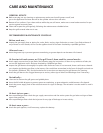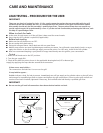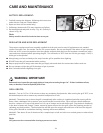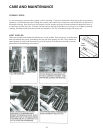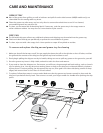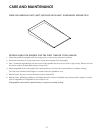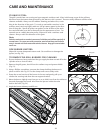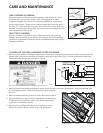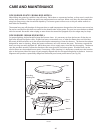Special offers from our partners!

Find Replacement BBQ Parts for 20,308 Models. Repair your BBQ today.

33
CARE AND MAINTENANCE
LEAK TESTING – PROCEDURE FOR THE USER
IMPORTANT!
There are two levels of testing for leaks. (1) Gas supply connection points that are accessible with the grill
installed can be leak tested by the user. (2) Connections that are internal to the grill and therefore require
disassembly should only be leak tested by a qualified gas fitter. The procedure below does not require any
special expertise and can be performed by a user. If you do not feel comfortable performing the leak test, seek
the help of a qualified gas fitter.
When to check for leaks
■
At the start of each season, or if the grill hasn’t been used for several weeks.
■
Every time the LPG cylinder is replaced (if applicable).
Before leak testing
■
Make sure that all the burners are OFF.
■
Do not smoke while leak testing.
■
Extinguish all open flames. Never leak test with an open flame.
■
Make a soap solution one part liquid detergent and one part water. You will need a spray bottle, brush, or rag to
apply the solution to the accessible gas supply connection points. For LPG units, check with a full cylinder.
■
Note: we recommend keeping a spray bottle of soapy water handy near the grill for your convenience.
To test
1. Make sure all knobs are in the OFF position.
2. Turn the gas supply ON.
3. Check all the leak test points shown in the applicable drawing below (LPG or Natural gas
supply) by applying the soap solution around each connection.
If there are no soap bubbles…
The connections are leak free. You can use the grill.
If soap bubbles appear…
Bubbles indicate a leak. If a leak is present, immediately turn off gas supply at the cylinder valve or shut-off valve,
and arrange for a qualified gas fitter to inspect and tighten the gas connections. Do not use the grill until all con-
nections have been checked, tightened if necessary, and verified to be leak free by a qualified gas fitter.
IMPORTANT!
■
Do not use the grill until all connections have been checked and do not leak.
CHECK HOSE FOR
SIGNS OF ABRASIONS,
CRACKS, OR LEAKS
LEAK TEST POINTS
Bottom of unit
LEAK TEST POINTS
FIG. 46 LPG Gas
FIG. 47 Nat. Gas



